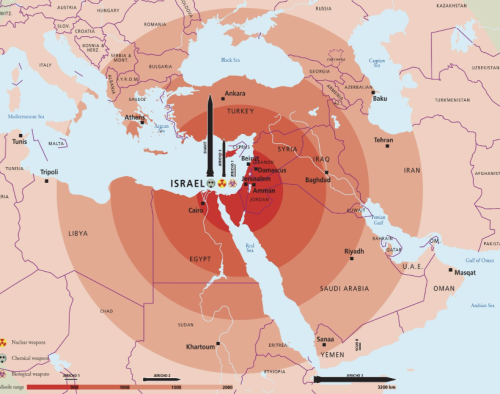Israel, although it has never officially acknowledged possessing nuclear weapons, has around 90 nuclear warheads in 2024 according to SIPRI (Stockholm International Peace Research Institute). Other estimates suggest up to 400 warheads , thanks to plutonium enrichment at Dimona.
⚖️ A unique deterrence doctrine: the Samson option (ברירת שמשון)
Inspired by the biblical character, this doctrine provides for the use of nuclear weapons in the event of an existential threat against the State of Israel, such as:
- A nuclear attack,
- The invasion of the territory,
- The destruction of its vital military capabilities.
The objective: to completely destroy the aggressor , even if Israel is already in a critical situation, to guarantee total revenge and to inscribe in history that any attempt to annihilate the Jewish people will result in an absolute response.
Israeli nuclear strike vectors
1. The “nuclear suitcase”
A covert attack by a special unit carrying a low-yield bomb (e.g., 15 kilotons) in the form of a car bomb or other means of infiltration. Effects: Tens of thousands of deaths in a city like Tehran.
2. Cruise missiles from submarines
Israel has at least three Dolphin AIP submarines , capable of launching second-strike nuclear missiles from:
- The Gulf of Oman towards Tehran (1,500 km),
- The Indian Ocean to port cities in southern Iran.
3. Strategic Aviation (F-15, F-35)
The Israeli Air Force can use its stealth aircraft for precision nuclear strikes, benefiting from « open skies » over Syria and Iraq. Estimated capacity: 300 kilotons per warhead.
4. Jericho ballistic missiles
- Jericho 1 : Withdrawn (range 500 km).
- Jericho 2 : Range up to 3,500 km , possible 1 megaton warhead .
- Jericho 3 : In service since 2011, estimated range between 4,800 and 6,500 km , capable of covering all of Eurasia and North Africa . Capable of multiple-warhead strikes (MIRV) .
Deterrence based on ambiguity
Israel has never officially confirmed its nuclear arsenal, an opaque deterrence policy (strategic ambiguity) which allows it:
- To avoid international sanctions,
- To maintain a credible deterrent position.
Why is this strategy essential for Israel?
According to analysts like Yehezkel Dror, the use of nuclear weapons goes beyond military deterrence : it is about preserving the national identity and collective confidence of the Jewish people. Even after a destructive nuclear attack on Israel, retaliation would be inevitable, for psychological, historical, and civilizational reasons .
Alain SAYADA for Israel News




